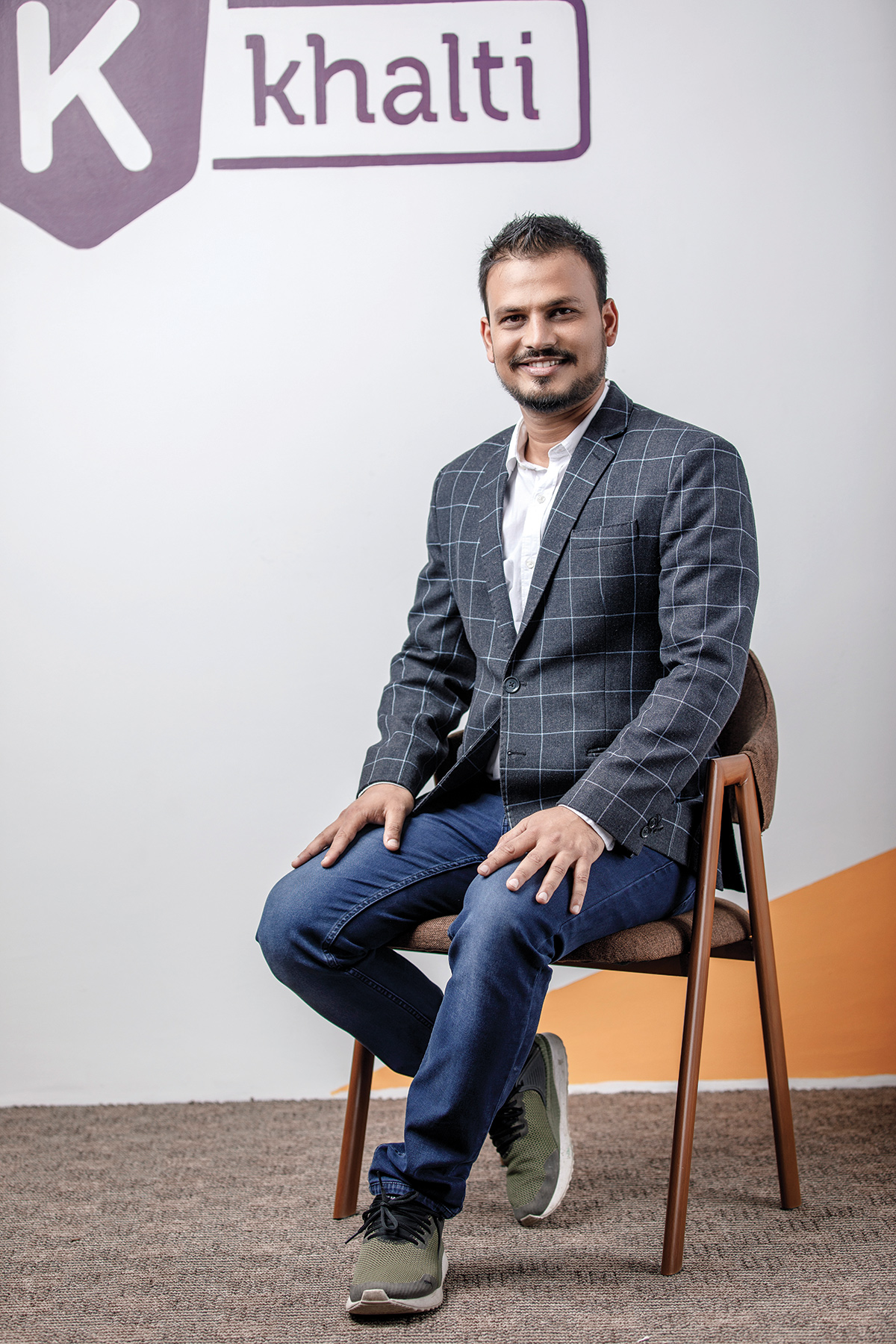
Text by Avant Shrestha
In the mid-2000s a nation was cautiously playing with the idea of computer technology and the advancement of internet. Around the same time a group of young engineering students in a rented three bed-room flat were discussing the early stages of a business idea.
The idea was about starting a tech firm with the intent to help and change the consumption habit of the nation through the power of computer engineering. The scenario is comparable to movies based on tech entrepreneurs of far distant and developed nations or a story of Silicon Valley’s mega tech giant. But not quite. This is the story of Manish Modi, the Co-Founder and Managing Director of Khalti, a young entrepreneur recognized for changing the way money is used in the country.
An Entrepreneur’s Journey
Manish Modi claims that he always wanted to be an entrepreneur from the beginning. As a child he use to sit in his father’s clothing store and worked there as and when required. “I come from a Marwari background and the idea of hard work and entrepreneurship was instilled in me since I was young and I think most of my basic entrepreneurial instincts came from my time in my father’s shop”, claims Modi. Today Manish Modi describes himself as an entrepreneur with tech in his heart.
Basically, computer engineers have a different mentality when it comes to their outlook in life. For the less tech-savvy folks that mentality is of a problem solver. Modi believes a computer engineer is made to solve problems. He explains, “A computer engineer has a problem solver attitude plus when you are connected to technology you can solve problems on a much larger scale”. And of course in Nepal there are a lot of problems to be solved. Modi sees himself as someone who could intervene and integrate technology to help solve problems in the country.
Origins
Manish Modi was in his third year of college when he and his roommates started a company. They even registered the company’s address to that of the hostel they were residing in. As a young developer he needed an officially registered company and address VAT in order to sell his software to Nepal Telecom (NTC), the largest telecommunication service provider in the nation. A year before he started the company Modi was interning at NTC when he was assigned to develop a billing software. “My superior during the internship really liked our work and we got assigned to develop a billing software. After we developed it, our boss presented it to the team and they made the decision to purchase the software,” he recalls. Modi elaborates, “We started out from a three bed room flat along with my partners. It was the time when load-shedding was at its peak and we worked with two desktops and an inverter”. It was this struggle and the eventual success of the project that fuelled his passion for technology and marked the beginning of his entrepreneurial journey.
After the NTC project, Modi and team started working on outsourced projects for clients from Europe and America by developing systems for them. “As we developed VAS software for a company from the US, we realised that we could use this in Nepal as well. That’s when we decided to launch Sparrow SMS in Nepal in 2010”, he recalls. During the initial launch they gained a lot of positive reviews. The team was excited and energetic and was able to run the business for a year. However, Sparrow SMS’s dependency on telecommunication was a major hindrance. Modi explains, “It was really difficult to take our services to the international market because we needed to tie up with each telecommunication provider of each country”.
This drive and ambition to create a truly global software lead to the foundation of another product. In January 2011, Modi and team started an app called Picovico and by May of the same year they had gone ‘live’. Picovico is an app that can create video out of pictures. At the time they were working on Picovico, Nepal did not have a very favorable ecosystem for entrepreneurship let alone tech entrepreneurship. There were not many areas to find funding nor any sort of venture capital. Nonetheless, Picovico was selected for an incubation program that took Modi and his team to India, Chile and the United States.
During his travels, he had the opportunity to gain insight and mentorships. While attempting to market Picovico to the US, he got the opportunity to meet similar startups and share his ideas and expand his international networks. He got to experience the budding entrepreneurial eco-system in Banglore, India. He applied to Start UP Chile, a program initiated by the Chilean government where they would fund 100 companies across the world. They would fund $ 40,000 to each company. Among the best 100 companies that were selected, Modi’s company - Janaki Technology - was the only one from Nepal. “Participating in this program helped us understand and create a world-class product”, reminisces Modi.

On Home Ground
Modi recalls, “When we returned, we realised that there were two things missing in the Nepali technological eco-system that was halting its boom: payment gateway and logistics and delivery”.
He believes for e-commerce to fully reach its potential these components are mandatory.
Modi explains, “We were partially motivated by the trends happening in the neighbouring countries. For example, Paytm was booming in India and if you looked at China, all transactions were being done via Alipay or WeChat. In simple terms, Khalti is a result of us trying to solve a major problem in our region using modern technology”.
Khalti: A Digital Wallet
Basically Khalti is a digital wallet, payment gateway and service provider that is emerging as an online payment solution owned and operated by Sparrow Pay. Khalti was launched in January 2017 at the CAN Infotech to tremendous response. Although there were fears among the founders that the product would be rejected, people loved it because of the design and the user experience. “We gave lots of thought to the usability aspects. In any project we design, even if it is the best app, if an elder person can’t use it, it is not going to work in Nepal”, explains Modi. And that has been their winning factor.
“We see ourselves as more of a fin-tech company rather than a digital wallet which is only the distribution part of it. There are a lot of verticals in fin-tech for banking solutions or in the transportation sector. We want to be recognised as an innovative fin-tech company solving the problems in the payment industry in Nepal”, explains Modi.
Khalti is a company that was built bit by bit by its founders. “We designed the core architecture of the software so that it’s not dependent on anyone.That way we are confident that if there is a problem, the team and I can personally solve it,” he says. “We spent two years in the development phase for Khalti before we even thought about launching it. From architecture to market research, we never designed it from a Nepal perspective; we designed the product keeping in mind how Google or Facebook would have designed it”, elaborates Modi.
Collaborations
In today’s context, it is not hard to imagine what a digital wallet is. North American and Europeans nations and countries like China and India are using this widely. In laymen terms, a digital wallet is a replacement for your actual wallet. “When you think of a wallet, you think about something that holds your money and makes payments. So, when we incorporate “digital” into it, it’s a digital form of wallet,” explains Modi. He further elaborates, “It can be used to pay your electricity bills, internet bills or a restaurant bill or for booking a plane ticket. The ultimate goal is to replace your wallet with your phone”.
The idea of digital wallet and cashless economy has been a huge success around the world; and Nepal can be no exception. About his company’s long term ambition, Modi says it is to make sure that when someone needs to make a payment or send money digitally, they think of Khalti.

Overcoming Obstacles
Today Khalti is almost a household name but there were many challenges and moments of doubt that the team had to overcome. “You don’t have a set platform, no proper funding, and unless you break even, chances are pretty high that you’re going to die”, explains Modi. Adding, “No Nepali tech company has ever seen a true exit and been acquired by a bigger international company. So when you don’t have an exit plan, it’s passion alone that drives a company which is not enough”, he emphasises. “Also, it does not take any time to reach saturation in Nepal and also everything works at its own pace. Processes that take a week in another country might take a year in Nepal”, he says.
“Additionally, the talent pool is also pretty low in Nepal and it’s really hard to retain people. Here, you’re not competing in salary with other companies, you are competing with them wanting to abroad and there can be nothing you can do to stop them, which makes it really hard to find highly skilled manpower”, Modi expresses.
Sustainability
“You have to be able to give 2 to 5 years of your undivided time to your start up. If you’re thinking of doing anything part time, you can assume that the startup will never work. Additionally, it is futile to think you will earn money right after starting your business. If you have that perseverance, go ahead, or else you are in for really hard times”, explains Modi.
“You need to have a good company culture. A company needs to be like your first home. So that’s where we focus. Another thing I’ve learned is that mistakes are important and you should learn from them. You can’t move ahead without making mistakes. As Mark Zuckerberg said, ‘Move fast, break things’. If you have a problem, work to solve it, keep an open mind and learn. At Khalti, we don’t have a rulebook about solving problems; we simply work towards solutions”.
Modi also strongly believes that the government should proactively help with incubation programs focusing on tech startups.
Creating an Ecosystem
Recently Khalti has tied up with QFX Cinemas, OYO (hotel bookings), Tootle (Ride Sharing) and Foodmandu among others. Such collaborations mean that the digital payment ecosystem as well online service industry is functioning well. Modi elaborates, “Digital wallet in itself only offers a handful of services, so it’s the ecosystem that actually helps it to grow”. “Foodmandu has its own user base and audience and tootle similarly have their own user base. Khalti has the potential to be the mediator where we can help connect the ecosystem in a more user-friendly manner”, he explains.
“We help to bring the unbanked to banked and help the banked go to digital mediums”. When collaborations happen, the target audience widens and people and companies can grow together.

Policies
When a new payment system such as Khalti started out, there was no defined regulation. In Khalti’s case the regulations were built around the system only after they were introduced. “We can’t say that the government has provided us with everything that we require, nor can we say that the government has been a hurdle,” expresses Modi. “When we launched, there were no rules, but luckily in the process, the government introduced regulations and we also got a license for our business. This gave us direction and assurance,” he explains.
Modi sees an opportunity in the fact that the market is nascent and the environment not all-perfect which means bigger companies or multinationals are not an immediate threat, allowing ventures like Khalti the space and time to grow organically.
Life Mantra
When asked about what keeps a tech entrepreneur like him ticking, Modi simply stresses that it is hard-work, team-work and the fact that he is constantly learning.
He claims to be a workaholic and says, “Nothing comes easy; and if something does come easy then you can be sure that there is something wrong with it”.
A strong proponent of team work, he shares, “The best part about us is that out of the four partners, three of us were classmates in Pulchowk Engineering Campus. And four of us are computer engineers and we have been friends for more than a decade”. He articulates that they are together as a team not only for running a company. “It is about sharing the highs, the lows and sharing a common vision,” he says.
Future
Modi currently does not think beyond Khalti. He says, “Professionally, I think I will achieve something when I build something that touches millions of lives every day, or maybe if I can make Nepal’s first billion dollar IT company. I feel like there needs to be an IT unicorn in Nepal so that the world can see us”.


-1713949388.jpg)
-1713779693.jpg)
-1712728897.jpg)